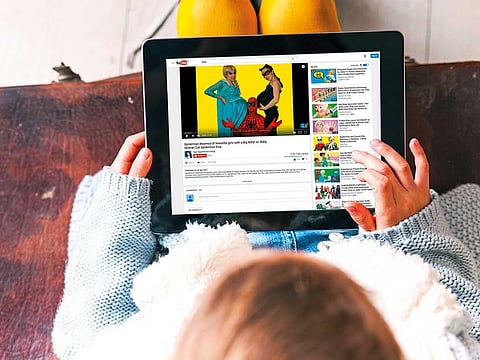A dangerous phenomenon on YouTube
Hashtag #Elsagate: A concern for parents

If you are a parent to a toddler, you are probably aware of YouTube video series like Peppa Pig and Ben and Holly’s Little Kingdom. You also probably know their opening theme songs, like me. However, here is something you may not have noticed.
In a web of video after video on your child’s little iPad, is a sort of a subset to the dark web.
My four-year-old is allowed about an hour of daily internet-time as I freshen up after work, before I sit and interact with him. During this time, he is given access to YouTube.
One day, I sat next to my son watching him enjoy nursery rhymes. A video that followed shocked me. It featured a woman dressed up as Elsa, from Disney’s animated movie, Frozen. She was pregnant; the content in the video seemed very age-inappropriate. I took away the iPad and observed a string of videos that followed, all with similar themes. I flagged these videos immediately.
A bit of research helped me understand that this is a growing trend on YouTube. Tens of thousands of videos targeted towards children contain not just adult topics, but a whole checklist of degenerate themes.
I wasn’t alone, other parents worldwide, were using hashtag #elsagate on Twitter, to flag this phenomenon.
A team of researchers even created a website www.investigatingyoutube.com, to spread awareness.
Suspicious videos
The recurring themes in the videos include dismemberment, kidnapping, fetishism, drug injections, pregnancy, abortions and learned helplessness.
According to investigatingyoutube.com: “To be clear, this is not a case of adult videos being misidentified. Nor is this a case of kids straying from the confines of the YouTube kids section. These videos are curated towards children. The content creators use search terms which would commonly be searched for by a child or a parent....”
The suspicious videos are disguised as innocent education and superhero videos.
Salman Khan
We spoke to some Gulf News readers, to see what they thought of the issue.
Dubai based parent, Salman Khan, who has a three-year-old daughter told Gulf News: “My wife alerted me about these videos. This is not limited to Elsa and Spiderman videos. They use popular characters like Mickey Mouse, too. The videos promote sexually suggestive themes, gore and bloody violence.”
Khan and his wife tackled the issue: “Together, we went through a lot of such videos and blocked the channels. Now we constantly keep a check on what our daughter is watching. We have limited her screen time.”
As a parent, my next concern was — how are these videos affecting my child’s psyche?
Dr Sweta Shah
According to Dr Sweta Shah, child psychiatrist at a hospital in the UAE: “A child’s brain at early ages always seeks new experiences. The idea of superheroes doing good deeds for society is completely lost in such videos. Fascination for these characters may cause children’s brain to automatically copy them to the finest details, including speech, dressing up and body language.”
But that’s not all. If your child is not directly watching these videos, you still have reason to worry. According to Dr Shah, “Children tend to role play in play groups. If a child has been exposed to such content, there are high chances that he or she is enacting it and peers are adopting the behaviour.”
For many parents putting a child in front of a video app is common method to make them eat.
Benaz Contractor
Dubai based mother Benaz Contractor who was unaware of the issue said: “I am a full-time mother, and I constantly monitor what my five-year-old daughter watches. However, I understand it may be difficult if both parents are working and they depend on a nanny.”
Alifiya Aliasgar
Gulf News reader Alifiya Aliasgar feels it all boils down to parenting. She said: “One may call me a helicopter parent but I watch everything that my child watches. We all know internet is not safe for children. One click leads to another and they could be exposed to any content.
“YouTube is not really rocket science, parents should check the filters available. Moreover, it is important to keep children informed. When you come to know such an issue exists, talk to them.”
Dr Shah agrees with Aliasgar’s views on communicating with children. She said: “It’s easier to communicate with older children, and tell them something is off-limits. But talking to toddlers is important too. If you communicate with them, they will often tell you what they have been watching.”
Is there a solution?
Amol Mane
According to Amol Mane, an IT applications manager based in Dubai: “The solution for parents is to constantly monitor and block such channels. YouTube reviews all content that is reported, they take down videos based on user feedback. Report inappropriate videos, especially if you feel they bypassed YouTube’s filtering settings.”
Mohammad Al Marashda
Mohammad Bin Haider Almarashda, an Emirati PhD researcher in national cyber security, currently based in the UK, told Gulf News: “We need a new global organisation and international laws to enable punishment for those who upload content, which could harm children.
"Social media companies should get together to assist in this. I also recommend the use aof rtificial intelligence mechanisms on media platforms such as YouTube. It will help in identifying any inappropriate content. Codes should be implemented to pick up offensive pictures or video content, rather than key words.”
Have you come across such videos? How did you tackle the issue? Write to us at readers@gulfnews.com



